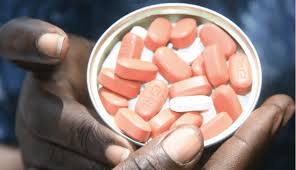 HIV treatment drugs.
HIV treatment drugs.Despite emergence of resistance, the HIV drug dolutegravir is still highly effective, with more than 90 per cent of patients achieving sustained viral suppression if they adhere to treatment, WHO has said.
The World Health Organisation called for urgent surveys to characterise the prevalence and patterns of resistance.
“As the use of dolutegravir-based antiretroviral treatment is scaled up, remaining vigilant in preventing and monitoring HIV drug resistance among infants newly diagnosed with HIV is imperative,” it said.
Kenya adopted the dolutegravir-based combination TLD (tenofovir, lamivudine and dolutegravir) as the backbone of its national programme in 2018.
Dolutegravir (DTG) is highly potent, has fewer side effects than older regimens and was thought to have a high barrier to resistance.
However, surveillance samples from Kenyan patients with viral non-suppression last year showed a resistance prevalence of up to 22.6 per cent in ART-experienced patients (on DTG as second or third line regimens) and 8.3 per cent in those failing a first line DTG-based regimen.
The WHO last year warned that its research in Mozambique, Malawi, Uganda and Ukraine found that resistance to dolutegravir ranged from around four to 20 per cent among sampled treatment-experienced who transitioned to a DTG-containing ART while having high HIV viral loads.
“The worrying evidence of resistance in individuals with unsuppressed viral load despite dolutegravir treatment underscores the necessity for increased vigilance and intensified efforts to optimise the quality of HIV care delivery,” Dr Meg Doherty, director, WHO department of the global HIV, hepatitis and STI programmes, said last year.
“Standardised surveillance of HIV drug resistance is essential for effectively preventing, monitoring and responding to these challenges”.
Earlier this year, scientists in Kenya began a year-long study to examine why some patients on DTG are not achieving viral suppression.
The work seeks to find out whether these cases are mainly due to missed doses and adherence problems or whether HIV is developing mutations that make the drug less effective.
The scientists will also evaluate whether these patients should be switched to another regimen.
The “Ndovu study”, supported by the Ministry of Health and the Gates Foundation, will run for 12 months. It will enroll participants across eight treatment sites in Kenya, Mozambique, Tanzania and Lesotho.
“The Ndovu study seeks to provide critical evidence for the management of DTG failure… whether and when viremia with DTG resistance requires regimen switch… and, whether switch to a protease inhibitor is the most appropriate option after failure on DTG,” said the researchers, led by Dr Loice Ombajo, an infectious disease specialist and a senior lecturer in internal medicine at the University of Nairobi.
“Initial results from the cohort are expected in March 2026 and from the RCT in February 2027,” the scientists said in a study protocol titled, ‘The dolutegravir failure cohort: a multi-country longitudinal cohort with a randomised clinical trial of continued dolutegravir versus switch to darunavir in people with viraemia while on dolutegravir in Sub-Saharan Africa (The Ndovu Study) protocol.’
The Ndovu researchers said they want to see how many patients keep the virus under control. For the group being followed for more than 12 months, the main goal is to check how many achieve a viral load below 200 copies by the end of the year. For the randomised trial, the key measure is how many reach that same level of suppression after six months.
The study will also look at which drug resistance mutations appear in patients who are not suppressed, how adherence affects outcomes and how patients and health workers feel about staying on dolutegravir versus switching to another drug, darunavir/ritonavir.
Health authorities and HIV programme managers are watching closely, as these results could inform national treatment guidelines.











